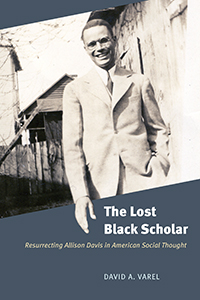The Book
The Lost Black Scholar: Resurrecting Allison Davis in American Social Thought. Chicago: University of Chicago Press, 2018.
The Author(s)
David A. Varel

One of the key themes of African American intellectual history is the recovery of intellectuals, activists, and scholars who often never received the full credit and praise they deserved from mainstream American society. Recent books such as Toward an Intellectual History of Black Women (2015) and Beyond Respectability (2017), among so many other recent works, have gone a long way towards not only correcting the historical record when it comes to the intellectual exploits of African American women, but also have reshaped who we should think of when we utter the work “intellectual.” David Varel’s The Lost Black Scholar asks us to look at another intellectual and scholar whose work has proven to be critical to twentieth century American history—but has not received the kinds of accolades given to a W.E.B. Du Bois or a Kenneth Clark. After reading The Lost Black Scholar, it will be difficult to forget about the achievements of social scientist Allison Davis.
Varel skillfully uses the story of Allison Davis—a social scientist in the fields of anthropology, sociology, and education—to tell a larger story of African American intellectual strivings before and during the Civil Rights Movement. To start, Varel positions Davis as “belong(ing) within the pantheon of eminent twentieth-century American intellectuals.” (4) But the reasons for Davis being largely ignored today are numerous. Allison Davis refused to stay within neat disciplinary boundaries—going from English to sociology to anthropology to education within only a few short years. But for Varel, this was actually a reminder of how often such barriers are damaging to larger scholarly conversations, especially those dealing with the intractable problems of racism. Additionally, the racism of the academy, and the wider world, in Davis’ own lifetime—he lived from 1902 to 1983—made it difficult for Davis to gain the attention he fully deserved. There is almost a sub-field of intellectual history that could be titled “African American Intellectuals Finally Gaining Their Due.” The work of Du Bois in building American sociology was skillfully researched and written about by Aldon Morris in The Scholar Denied (2017) is given a brother in the narrative of how Davis has, likewise, been minimized in his contributions to the fields of education and sociology.
If those contributions were merely what Varel covered here, the book would be important in its own right. But what also adds to The Lost Black Scholar is how Varel connects Davis’ earlier life in Washington, D.C. to his own strivings in the academy and beyond. Allison’s father, John, was a solidily middle-class African American man who worked hard in the federal government in the late 19th and early 20th centuries. Demoted from a position of leadership to laborer during the purge of African Americans from the government during the Woodrow Wilson administration, John Davis nonetheless worked to make sure his family kept their middle-class attitudes about life. Allison Davis’ family was “economically poor, (but) remained culturally rich.” (23) Davis’ own time at Dunbar High School was another formative experience for him—as it was for numerous other African American cultural and intellectual leaders who attended the prestigious high school in the nation’s capital.[1]
Davis’ academic career was varied, taking him to Williams College in New York, along with Harvard, study at the London School of Economics, and a PhD at the University of Chicago. At all these places, Davis was able to make an impact in various areas of the humanities and social sciences. He participated in the Harlem Renaissance of the 1920s, writing several short stories and poems—and quickly transitioned to social sciences during the 1930s. His time at the London School of Economics and Harvard allowed him a chance to get involved in the rapidly changing fields of anthropological research, while Chicago allowed Davis to blossom as a scholar of education.
Davis’ time at Chicago is what makes his career legendary among African American scholars. He was the first African American scholar to attain a full-time faculty position at a majority white institution, doing so in the 1940s as the nation responded to the threat of Fascism and Communism abroad by playing up racial progress at home. These two themes are tied together in The Lost Black Scholar, as Davis is more than willing to learn from Marxist and liberal interpretations of modern life to understand race and class in the American South (Deep South, 1941) and in education (Children of Bondage, 1940). His work was cited in both the Brown v. Board of Education decision of 1954 and in the research done to buttress arguments in favor of the Head Start program in the 1960s. Ironically, Davis’ willingness write about race and class, and to refuse ideas of “psychological damage” to African Americans contributed to his marginalization in later years. When St. Clair Drake—an associate and ally of Davis—confronted Daniel Patrick Moynihan over his lack of familiarity with Davis’ work (which would have challenged Moynihan’s arguments about black pathology), Moynihan seemed unfamiliar with Davis’ work on education and IQ tests.
Perhaps his greatest contribution to intellectual history was his dismantling of the racism behind IQ tests. Again, this history is critical to understanding the broader ways in which racism have influenced American life in ways often glossed over or forgotten about. But Davis’ work on IQ tests in the 1940s and 1950s also helped future scholars build larger arguments against their use. The career of Allison Davis will, hopefully, push more scholars to look into other intellectuals from marginalized communities in the United States and beyond still awaiting their full due.
[1] An intellectual history of Dunbar High School would be a fruitful addition to the fields of African American, and American, intellectual history.
About the Reviewer
Robert Greene II is the Book Reviews editor for the Society of U.S. Intellectual Historians.

0